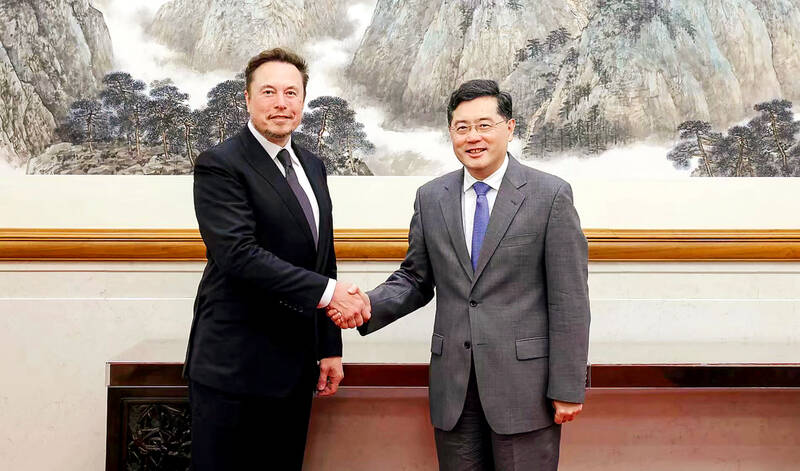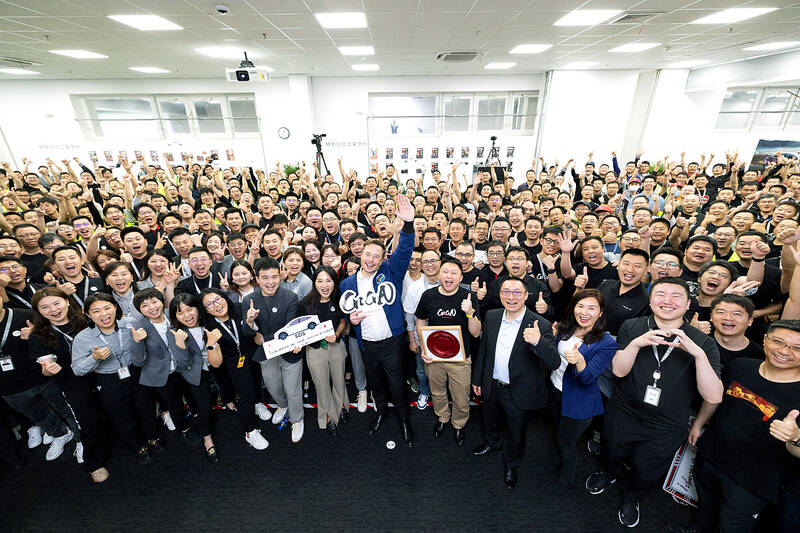Lavish meals, gushing praise and memes about “Comrade Musk” — China showered the Tesla CEO with admiration during his whistlestop tour of the country this week.
The mercurial magnate is a controversial figure in the West but widely admired in China, where Tesla’s electric vehicles have become a staple of middle-class urban life.
His visit was welcomed by Zhu Qi, a Tesla owner from the central city of Changsha who said she “worships” Musk for his “great personal charm and constant excellence in his field.”

Photo: AFP
“China is still not super open... so for people like him to come and share some of their knowledge with us, I think it’s something meaningful that our country and leaders can learn from,” said the 33-year-old university lecturer.
“Due to our exam-focused education system, I think it’s hard for China to produce someone like Musk, who has gained world-leading status based on his personal interests.”
Chinese social media was abuzz with news of Musk’s sojourn, with related hashtags on the Twitter-like Weibo platform racking up billions of views.

Photo: Reuters
Musk arrived in Beijing on Tuesday, holding meetings with top ministers and praising China’s “vitality and potential.”
He then stopped off in Shanghai — home to a vast Tesla manufacturing base — before his private jet left the city yesterday.
Photos of a reported 16-course dinner menu laid out for Musk’s arrival — featuring seafood, New Zealand lamb and traditional Beijing-style noodles — quickly went viral.
And many users were keen to show their appreciation for a man known affectionately as “Brother Horse” after the first character in Musk’s Chinese name.
“For Musk, there are no countries on this planet, only markets... to hawk your wares,” wrote one user.
“This is exactly the kind of borderless capitalism he predicted.”
Some took the opportunity to poke fun at the US at a time of strained ties between the world’s two largest economies.
“Our officials and media are going hard on this visit,” quipped one Weibo user.
“He’s apparently the only American welcome in China.”
“Biden must be wondering why China refuses his invitations to meet with top US officials, but rolls out the red carpet for Musk,” said another.
A typically tongue-in-cheek meme circulating on the platform this week depicted a statesmanlike “Comrade Musk” standing behind a podium flanked by Chinese flags as besuited officials applauded in the background.
But not everyone was taken in by Musk mania.
Several users noted an after-midnight post by a Tesla vice president showing photos of Musk posing with hundreds of beaming workers in Shanghai.
In recent years a growing number of Chinese tech workers have criticized the industry’s long hours and high-stress company culture.
“It feels a little outdated to make so many people stay into the middle of the night just to take some photos,” one user said.
“So you’re all working overtime tonight, huh?” wrote another.

The Democratic Progressive Party (DPP), Chinese Nationalist Party (KMT), and the country’s other political groups dare not offend religious groups, says Chen Lih-ming (陳立民), founder of the Taiwan Anti-Religion Alliance (台灣反宗教者聯盟). “It’s the same in other democracies, of course, but because political struggles in Taiwan are extraordinarily fierce, you’ll see candidates visiting several temples each day ahead of elections. That adds impetus to religion here,” says the retired college lecturer. In Japan’s most recent election, the Liberal Democratic Party lost many votes because of its ties to the Unification Church (“the Moonies”). Chen contrasts the progress made by anti-religion movements in

Taiwan doesn’t have a lot of railways, but its network has plenty of history. The government-owned entity that last year became the Taiwan Railway Corp (TRC) has been operating trains since 1891. During the 1895-1945 period of Japanese rule, the colonial government made huge investments in rail infrastructure. The northern port city of Keelung was connected to Kaohsiung in the south. New lines appeared in Pingtung, Yilan and the Hualien-Taitung region. Railway enthusiasts exploring Taiwan will find plenty to amuse themselves. Taipei will soon gain its second rail-themed museum. Elsewhere there’s a number of endearing branch lines and rolling-stock collections, some

This was not supposed to be an election year. The local media is billing it as the “2025 great recall era” (2025大罷免時代) or the “2025 great recall wave” (2025大罷免潮), with many now just shortening it to “great recall.” As of this writing the number of campaigns that have submitted the requisite one percent of eligible voters signatures in legislative districts is 51 — 35 targeting Chinese Nationalist Party (KMT) caucus lawmakers and 16 targeting Democratic Progressive Party (DPP) lawmakers. The pan-green side has more as they started earlier. Many recall campaigns are billing themselves as “Winter Bluebirds” after the “Bluebird Action”

Last week the State Department made several small changes to its Web information on Taiwan. First, it removed a statement saying that the US “does not support Taiwan independence.” The current statement now reads: “We oppose any unilateral changes to the status quo from either side. We expect cross-strait differences to be resolved by peaceful means, free from coercion, in a manner acceptable to the people on both sides of the Strait.” In 2022 the administration of Joe Biden also removed that verbiage, but after a month of pressure from the People’s Republic of China (PRC), reinstated it. The American